

Driving Excellence
Said Abdullah Al Hatmi Chief Executive Officer





















YOUR PARTNER IN EXCELLENCE

YOUR PARTNER






E N T


TOGETHER WE EXCEL FOR A PROMISING FUTURE IN THE BANKING SECTOR



TOGETHER WE EXCEL FOR A PROMISING FUTURE IN THE BANKING SECTOR





























































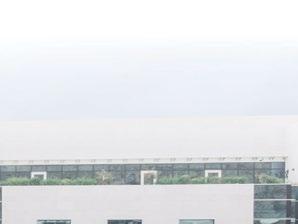





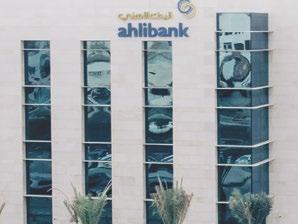







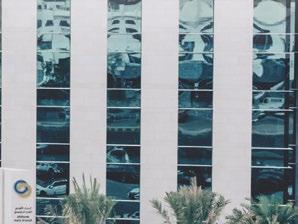













EDITORIAL
Mayank Singh
Khalfan Al Rahbi
Ghalib Al Fori
Oommen John P
Alvin Thomas
DESIGN
Senior Production ManagerPrint & Digital
Ramesh Govindraj
Assistant Art Directors
Aliya Al Wahaibi
Khoula Al Wahibi
Chief Photographer Rajesh Rajan
MARKETING
Associate Advertising Director
Shivkumar Gaitonde
Business Manager
Dhanish Pillai
CORPORATE
Chief Executive Officer
Atulya Sharma
Deputy CEO
Said Masoud Almashani
Published by United Press & Publishing LLC
PO Box 3305, Ruwi, Postal Code - 112 Muscat, Sultanate of Oman
Tel: (968) 24700896
Fax: (968) 24707939
EDITOR’S NOTE
Growth Enabler
Oman has a well-established banking sector with strong oversight from the Central Bank of Oman (CBO). In recent years, CBO has implemented various reforms to modernize the banking infrastructure, boost transparency, and ensure financial stability. As Oman economy transitions away from energy dependence to diversify its economic base there is a greater emphasis on sectors like tourism, manufacturing, and services. The banking and finance industry plays an essential role in financing these efforts and fostering economic diversification.
A notable achievement of the banking sector has been the steady growth of Islamic banking with increasing demand for Sharia-compliant financial products. Oman’s Islamic finance market is expected to continue expanding as part of the government’s push to diversify its economy. Oman’s banks have posted robust results for year 2024. Omani banks listed on the Muscat Stock Exchange (MSX) posted a 15.2 per cent year-on-year increase in net profits for 2024, reaching RO522.6mn, compared to RO453.5mn in 2023. The profitability boost is attributed to Oman’s economic growth and the improved performance of several key sectors, which bolstered banks’ earnings as they increased financing for both economic projects and individuals.
According to financial statements released by the banks, all seven listed institutions reported higher profits for the year. Bank Muscat led the pack, recording the largest profit at RO225.5mn, up from RO212.4mn in 2023. Sohar International Bank followed with a net profit of RO100.2mn, a notable increase from RO70.3mn in 2023. National Bank of Oman posted a profit of RO63mn, while BankDhofar reported RO43.6mn in net earnings. Other banks included ahlibank at RO41.6mn, Oman Arab Bank at RO30.4mn, and Bank Nizwa at RO18.1mn.
In terms of total assets, the seven listed banks saw a 7.3 per cent increase year-on-year, reaching RO41.6bn by December 2024, up from RO38.8bn in 2023. Bank Muscat again led the sector with total assets of RO14.04bn. Sohar International Bank followed with assets of RO7.3bn, while the National Bank of Oman had RO5.2bn in assets. BankDhofar ranked fourth with approximately RO5.1bn, and Oman Arab Bank placed fifth with RO4.3bn. Ahlibank’s assets totalled RO3.7bn, and Bank Nizwa’s assets stood at RO1.886bn.
Banks in Oman are expected to maintain their solid performance in FY2025, led by their digital transformation efforts, moderate loan growth, and a focus on both retail and corporate banking. The shift towards Islamic finance, and sustainable investment will also drive growth, while maintaining financial stability and managing risk.






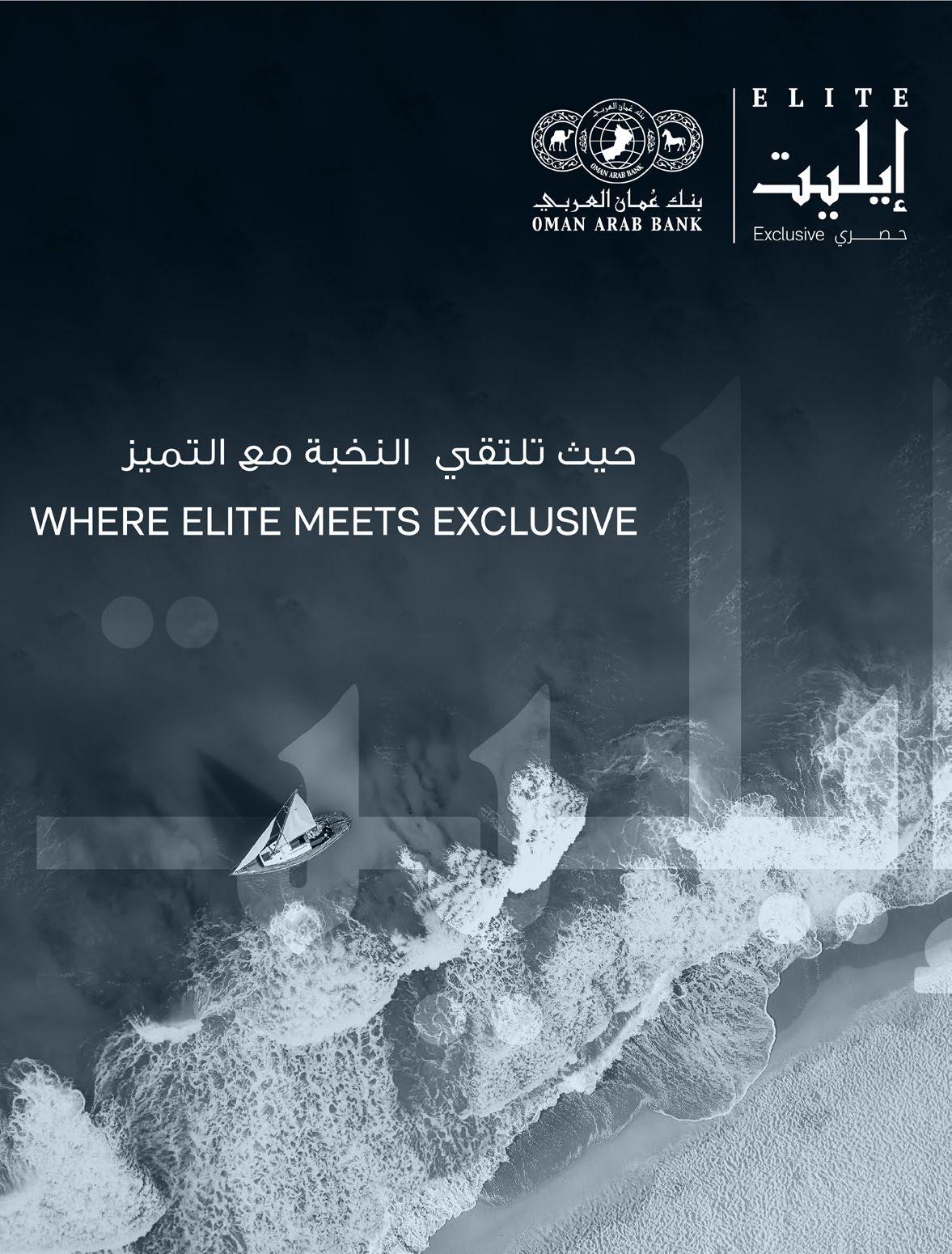
Bank Muscat posts net profit of RO225.58mn for the year ended December 31, 2024

Bank Muscat, the flagship financial institution in the Sultanate, announced its preliminary unaudited results for the year ended December 31, 2024. The Bank posted a net profit of RO225.58mn for the period compared to RO212.45mn reported during the same period in 2023, an increase of 6.2 per cent.
The key highlights of the results for the period are as follows: Net Interest Income from Conventional Banking and Net Income from
Islamic Financing stood at RO 397.70mn for the year ended December 31, 2024 compared to RO 374.82mn for the same period in 2023, an increase of 6.1 per cent; Non-interest income was RO 145.00mn for the year ended December 31, 2024 as compared to RO 138.00mn for the same period in 2023, an increase of 5.1 per cent; Operating expenses for the year ended December 31, 2024 was RO 209.26mn as compared to RO 196.39mn for the same period in 2023, an increase of 6.6 per cent;
Net impairment losses on financial assets for the year ended December 31, 2024 was RO 64.41mn as against RO 64.66mn for the same period in 2023; Net Loans and advances including Islamic financing receivables increased by 3.7 per cent to RO10,247mn as against RO9,877mn as at December 31, 2023; Customer deposits including Islamic Customer deposits increased by 3.6 per cent to RO 9,777mn as against RO 9,438mn as at December 31, 2023.
Sohar International successfully raises RO130mn growth capital, largest Rights Issue in 2024
Demonstrating strong Investor confidence, Sohar International has successfully concluded its 2024 rights issue, raising RO130mn, further strengthening its capital base to support future growth initiatives.
The Issuance marks one of the largest Rights issues in 2024 on the Muscat Stock Exchange (MSX). The capital raise showcases Sohar International’s dedication to growth with excellence, aligning with Oman’s Vision 2040 by promoting sustainable development and empowering businesses, individuals, and communities. The proceeds from the rights issue will primarily be utilized to enhance capital buffers, fuel strategic initiatives, and expand product and service offerings, particularly

Alizz Islamic Bank launches ‘Sports for All’ initiative to promote a healthy lifestyle

As part of the banks ‘Alizz Cares’ program and underscoring its commitment to fostering inclusivity, empowering communities, and enhancing the quality of life, Alizz Islamic Bank recently announced the ‘Sports for All’ initiative that strives to encourage sports and development into the community. This ‘Sports for All’ initiative reflects the bank’s commitment to promoting inclusivity, health, equality and public welfare through sports, aligning with the United Nations Sustainable Development Goals. The first arm of this initiative will be the bank partnering with Special Olympics Oman to sponsor a specialised full year training programme for 10 athletes.
The launch ceremony was held under the auspices of H.E Sheikh Rashid bin Ahmed Al Shamsi, Undersecretary, Ministry of Social Development in the presence of Ali Al Mani, CEO, Alizz Islamic Bank, former Oman National Team players Ali Al Habsi and
in sectors crucial to Oman’s economic development. This move aligns with banks commitment to deliver sustainable value to both shareholders and the broader economy. Commenting on the successful completion of the rights issue, a spokesperson of Sohar International, remarked, “This milestone marks a pivotal moment in our journey, reaffirming our resolve to fortify our financial foundation. The trust our shareholders have shown is a clear endorsement of their steadfast belief in our strategy and future direction. This achievement not only strengthens our capital base, ensuring resilience against future economic uncertainties, but also provides the vital resources necessary
Mudhafar, the
of the bank and other
management
from Special Olympics Oman. Speaking at the launch, Ali Al Mani, said “At Alizz Islamic Bank we believe that sports can be used as a catalyst for positive change and we are committed to empowering all ages, abilities and backgrounds. We believe in the importance of educating the public about the benefits of sports and engaging in physical activities which resonates with our collective dedication to making an impact to the society.”
Al Mani added “As a society, it is important that we break down social barriers and ensure equal access to sporting opportunities to everyone and by championing accessibility and with special needs initiatives we promote inclusivity and harness diverse talents and perspectives of every member of our community. Through our ‘Sports for All’ initiative and our partnership
to accelerate our growth trajectory. The funds raised will power our ongoing business development, fuelling the execution of our transformation agenda, which is closely aligned with the evolving banking landscape and our enduring vision.”
Sohar International Bank’s 2024 Rights Issue launched in November 2024, attracted a broader and diverse investor base, including Government and Private institutions, Family Offices and Individuals. The overwhelming support from our shareholders reflects their belief in our growth strategy and commitment to deliver sustainable value. Participation in
with the Special Olympics Oman, we are striving to create a community that provides meaningful opportunities for individuals of all abilities to benefit from advantages of participation in sports.”
Special Olympics Oman works with the objective to build behavioural, physical, and professional skillsets of its members by integrating them into society. The association’s longstanding commitment to raise awareness on the needs of people with special needs extends to supporting and encouraging their participation in social, cultural, sports, health, professional and recreational activities, in collaboration with government and non-government entities. In addition, Special Olympics Oman works with the families of people with special needs, involving them in programs, initiatives and events that are designed for the benefit of their children while promoting a culture of volunteerism.
the Rights Issue recorded a remarkable 65per cent increase in the number of investors compared to the previous Rights issuance in 2022. The success of the Issuance is a testament of the strong fundamentals of the bank and the unwavering confidence of Sohar International Shareholders despite challenging market conditions. Following the launch, the allotted rights were then successfully listed on Muscat Stock Exchange (MSX) on December 2, 2024. Together with the support of the Muscat Clearing & Depository (MCD) and the Muscat Stock Exchange (MSX), the issuance was also governed by the Central Bank of Oman (CBO) and the Financial Services Authority (FSA).
Hassan
executive
team
dignitaries
IN THE NEWS
Celebrating 17 years of excellence: ahlibank commemorates its triumphant journey
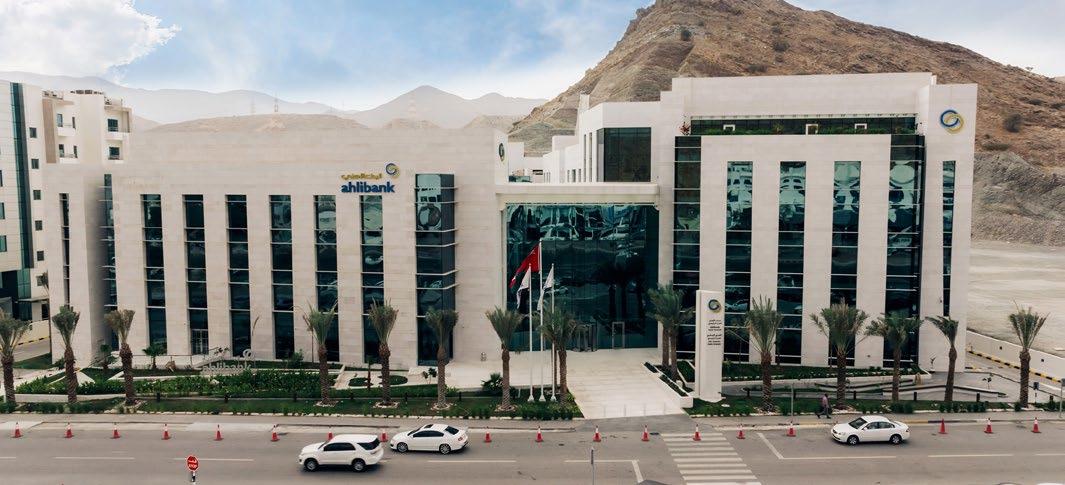
ahlibank, one of the Sultanate’s most esteemed financial institutions, recently celebrated its 17th anniversary, marking a milestone that reflects both its enduring success and its unwavering dedication to sustainable growth. This significant occasion served as a moment of reflection for the bank’s employees, celebrating the core principles that have cemented ahlibank as a trusted ‘Partner in Excellence.’
Founded in 2007, ahlibank has evolved into a leading force in Oman’s financial sector. With a diversified portfolio of financial solutions, supported by a modernised branch network, advanced digital platforms, and a highly skilled workforce, ahlibank continues to meet the dynamic needs of its clientele across retail, commercial, and investment banking sectors. During the anniversary celebration, ahlibank’s employees engaged in activities designed to deepen their connection to the bank’s core values—excellence, innovation, integrity, responsibility, and sustainability. These initiatives served not only to inspire pride in their contributions but also to reinforce the shared vision that drives the bank’s continued success.
Central to this vision are ahlibank’s five pillars of excellence—Digitalisation, Corporate
Banking, Retail Banking, Wealth Management, and Socio-Economic Progress—which are intrinsically linked to these values. Together, they guide ahlibank’s strategic direction, ensuring the delivery of superior customer experiences and fostering meaningful contributions to community development.
ahlibank’s commitment to digital transformation is clearly demonstrated through its enhanced mobile banking app, instant credit card issuance, and cutting-edge digital services and branches, positioning the bank at the forefront of innovation.
Groundbreaking initiatives like 1:1 IPO financing and instant minor account openings further reinforce its digital leadership. In Corporate Banking, ahlibank continues to deliver tailored solutions through dedicated relationship managers and businessto-business platforms, while its Retail Banking division focuses on providing a seamless experience through an extensive branch network and customised services, all powered by advanced digital tools.
Complementing these efforts, ahlibank’s Wealth Management services, including the Digital Wealth Management system and Systematic Investment Plan, foster long-term financial growth, integrating
seamlessly with corporate and retail banking offerings. In alignment with its commitment to socio-economic development, the bank undertakes several initiatives geared at empowering SMEs, supporting non-profit organisations, and nurturing young talents. These interconnected pillars reflect the bank’s vision, reaffirming its leadership in innovation and sustainable growth in Oman.
In 2024, ahlibank achieved significant milestones, strengthening its role in advancing Oman Vision 2040. The bank successfully issued Additional Tier 1 (AT1) Bonds, raising RO40mn to bolster its capital adequacy. It also played a pivotal advisory role in securing RO40.6mn for The Sustainable City, Yiti, and supported the second phase of Khazaen Economic City, driving forward sustainable economic development.
Additionally, the bank’s financial closure for the Industrial Waste Treatment Facility at Sohar Port marked a critical step in reducing Oman’s reliance on hazardous waste exports. As the bank drives progress, its unwavering commitment to excellence remains central to every initiative, consistently setting new standards and reshaping Oman’s dynamic financial landscape.
Bank Nizwa fuels Oman’s growth with innovative Islamic Banking solutions
Under the astute leadership of His Majesty Sultan Haitham Bin Tarik, the Sultanate of Oman has emerged as a beacon of resilience within the GCC. The nation’s dedication to fiscal discipline, economic diversification, and sound financial management has laid a solid foundation for sustained economic growth, exemplified by S&P Global’s upgrade of Oman’s credit rating to investment grade in September 2024.
This achievement has strengthened investor confidence, lowered borrowing costs, and opened doors to international capital markets. Additionally, Fitch Ratings revised Oman’s outlook to ‘Positive’ in December 2024, citing successful fiscal reforms and prudent debt management.
Amid this steady economic progress, Oman’s Islamic banking sector has played a pivotal role in shaping the financial landscape. Integrating Sharia principles with the evolving needs of a modern economy, Islamic banking assets in the Sultanate surpassed RO8.2bn by the end of September 2024, accounting for 18.7 per cent of total banking assets, recording an increase of 16.4 per cent compared to the same period last year.
Additionally, the total financing granted has grown by 13.8 per cent, reaching approximately RO6.7bn. Furthermore, deposits have increased by 24 per cent, totalling around RO6.5bn by the end of October 2024. This growth reflects a rising trend towards Sharia-compliant solutions. The sector’s financing portfolios and deposits also recorded substantial growth, reflecting the rising preference for Sharia-compliant solutions. As Oman’s first full-fledged Islamic bank, Bank Nizwa has been instrumental in this sector’s evolution.
Commenting on the same, Khaled Al Kayed, CEO, Bank Nizwa, said, “In the five years since His Majesty Sultan Haitham bin Tarik, may God protect him, ascended to the throne, the Sultanate of Oman has entered a distinguished era of renaissance. This transformative phase has yielded significant advancements across various economic sectors, thereby fostering comprehensive and sustainable development throughout the nation. Under the enlightened

leadership of His Majesty, Oman is not only enhancing its economic framework but also establishing a solid foundation for a prosperous and resilient future for all its citizens.”
“Amid this renaissance, the Islamic finance sector in the Sultanate of Oman has witnessed significant growth, establishing itself as a vital contributor to the country’s economic development. At Bank Nizwa, we take pride in our leadership in this sector by aligning our initiatives with Oman’s ambitious goals. Through our Sharia-compliant solutions, we continue our unwavering efforts to enhance economic empowerment and make a positive and meaningful contribution to the social and economic fabric of the nation,” he added.
Bank Nizwa’s financial performance in 2024 reflects its unwavering commitment to excellence, innovation, and customer-centricity. For the third quarter ending September 30, the bank reported a net profit of RO12,431mn, representing a 6 per cent increase from the previous year. Total assets rose to RO1.770bn, a 13% growth, while the financing portfolio
expanded by 14 per cent to RO1.507bn. Customer deposits surged by 20 per cent, reaching RO1.440bn—a testament to the bank’s strong market positioning and its ability to meet dynamic customer demands.
Complementing its financial achievements, Bank Nizwa has played a transformative role in fostering Islamic financial literacy across the Sultanate. Through workshops, seminars, and digital initiatives, the bank has raised awareness about the benefits of Islamic finance, empowering individuals and businesses to actively participate in Oman’s economic progress. This commitment to education is part of the bank’s larger goal to make ethical financial solutions available to everyone.
A key driver of Bank Nizwa’s impact lies in its tailored financing solutions, which have facilitated milestones in critical sectors. By supporting both SMEs and large-scale ventures, the bank has directly contributed to projects that contribute to Oman’s economic diversification agenda and Oman Vision 2040 goals.
Bank Muscat acknowledged amongst Top 10 Performing Companies in MSX
In recognition of its pioneering roles in delivering the best banking services and products for individual and corporate customers, Bank Muscat, the leading financial services provider in the Sultanate of Oman, was recently honoured with The Top Performing Company Award in large capital segment at the Oman Economic Review (OER) Corporate Excellence Awards ceremony held recently at the Sheraton Oman Hotel. The event was organised under the patronage of H.E. Faisal Abdullah Al Rawas, Chairman of Oman Chamber of Commerce and Industry. Prominent business figures and public company officials also attended the ceremony. The award was received by Khalifa Abdullah Al Hatmi, Deputy General Manager - Investment Banking and Capital Markets at Bank Muscat.
Bank Muscat was awarded based on a survey conducted by Moore in collaboration with OER about top performing companies listed on the Muscat Securities Exchange MSX. The Bank met the eligibility criteria, including strong financial performance, strategic growth, innovation, corporate social responsibility, and

its significant contributions to the development of Oman’s banking sector. The recognition represents another milestone in the Bank’s impressive achievements and successes over its more than 40-year history, reaffirming its leading position in the banking sector in the Sultanate and its excellence in providing the best banking services to individual and corporate customers in the region. Speaking on the occasion, Khalifa Abdullah Al Hatmi, Deputy General Manager - Investment Banking and Capital Markets at Bank Muscat, said, “We
are immensely pleased about having Bank Muscat included amongst the top performing companies in the large capital segment. This recognition reflects the Bank’s commitment to sustainable growth, innovation, and contribution to the economic development of the country. It also highlights the Bank’s significant role in various fields, including offering innovative digital banking solutions and facilities for customers, focusing on expanding the customer base and enhancing customers’ banking experience.
ahlibank empowers SMEs to thrive through ahli Expo 2024
ahlibank successfully concluded “ahli Expo 2024,” the first of its kind exhibition organised by the bank, receiving wide acclaim from entrepreneurs and experts. This innovative initiative aimed to support small and medium enterprises, enhance communication and collaboration among them, and provide an opportunity to showcase their services. The event was held at ahlibank’s headquarters in Wattaya on December 11 and 12, 2024, featuring an array of interactive workshops and meaningful group discussions.
A main feature of the expo was the exhibition of Omani SMEs, offering attendees, including industry experts, a chance to explore the capabilities of these emerging businesses and their innovative offerings. The event also included thought-provoking discussion sessions on topics such as “The Future Growth of SMEs in the Era of Artificial Intelligence and Advanced Technologies” and “Fostering Creativity in Business Environments –Innovation in the Face of Challenges.” These

distinguished discussion panels centered on various themes designed to empower SMEs to achieve growth and long-term success.
ahli Expo 2024 witnessed the launch of the ahlibank POS Financing program, a program that targets SMEs who are willing to use ahlibank’s POS machines. The program is designed to grant short/medium term loans against POS receivables of the company for operating and capital expenditures as per the credit parameters set in the approved product document. Key features to note about the POS Financing program is the loan amount which is capped at RO150K for up to 36 months. In addition, corporate credit cards as a combined solution are provided for up to 15 per cent
of the financing limits, which is capped at RO10K. The daily repayment is tied to POS transactions, and customers should note that the approval and disbursement processes are quick and hassle-free. It is a flexible and simple solution set to empower SMEs with the needed financial support to grow their businesses.
With a steadfast dedication to empowering businesses, and as a true ‘Partner in Excellence,’ ahlibank offers tailored financial solutions designed to help SMEs achieve their full potential. ahli Expo exemplified the Bank’s pursuit towards simplifying banking for businesses whilst simultaneously furthering innovation and entrepreneurship.
Enhancing its prominent leadership as the most-trusted Islamic banking partner, Bank Nizwa, the leading Islamic bank in the Sultanate of Oman, was recently titled ‘Strongest Islamic Retail Bank in Oman 2024’ at the Islamic Retail Banking Awards (IRBA). This prestigious accolade highlights Bank Nizwa’s commitment to providing innovative Shariacompliant banking solutions, underpinned by a profound understanding of its customers’ evolving needs and a steadfast dedication to service excellence. The award was graciously accepted by Talib Al Yarubi, Head of Branches of Bank Nizwa, on behalf of the bank.
The Islamic Retail Banking Awards 2024, now in its 10th edition, convened a distinguished assembly of industry luminaries, C-suite executives, and leaders from across the region. The awards celebrated 50 top-performing entities in the Islamic retail financial services sector from the GCC, the Far East, Africa, Asia, and the Western Hemisphere, based on a global ranking of Islamic banks conducted by the Cambridge Institute of Islamic Finance.
Sohar International wins ‘Best Government Banking in Oman 2024’ at International Business Magazine Awards Bank Nizwa wins strongest Islamic Retail Bank in Oman 2024 award
Sohar International, Oman’s best bank, has been honoured with the title of ‘Best Government Banking in Oman 2024’ by International Business Magazine. This prestigious accolade underscores the bank’s pivotal role in the government banking sector, showcasing its comprehensive suite of tailored financial products and services designed to meet the unique needs of government entities. As a key enabler of national mega projects, Sohar International has positioned itself as a catalyst for propelling the Sultanate’s economic growth.
The award was presented at a grand ceremony held at Atlantis, The Palm in Dubai which was attended by Khalil Salim Al Hedaifi, Chief Government and Private Banking Officer, and Mazin Mahmood Al Raisi, Chief Marketing Officer, along with representatives from prominent regional and international financial institutions. Commenting on the award, Khalil Salim Al Hedaifi, stated, “Being awarded such a coveted title is not just a reflection of our leadership in the sector, but a direct

Bank Nizwa’s recognition on this prestigious international platform underscores its leadership in the Islamic finance sector. Reflecting on this honour, Mohamed Al Ghassani, Chief Retail Banking officer at Bank Nizwa, commented, “We are immensely proud to be recognised at the IRBA as the Strongest Islamic Retail Bank in Oman, as this accolade not only shines the spotlight on our expertise in Islamic banking but also solidifies our position at the forefront of the sector. Furthermore, this award inspires us to persist in our journey of innovation and excellence, delivering groundbreaking Islamic
banking solutions.” The retail banking division at Bank Nizwa offers a comprehensive suite of personal banking solutions, including savings and current accounts, alongside customized auto, home, and personal finance offerings designed to meet the diverse needs of its retail customers. This array of services is further enhanced by the bank’s userfriendly digital banking channels, including a robust mobile banking app, internet banking services, and a digital branch, all of which significantly improve accessibility and convenience for all customers.
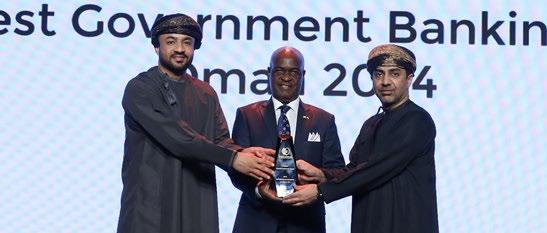
endorsement of the trust and confidence placed in us by the institutions that drive national progress. At Sohar International, we go beyond being a traditional service provider—we are a strategic partner to the government, helping navigate the complexities of public sector financing. Our approach is anchored in delivering bespoke, forward-thinking solutions that align with Oman’s Vision 2040, supporting the country’s efforts to diversify and grow its economy. On the other hand, our
dedication to innovation and the seamless integration of modern financial technologies has enabled us to enhance the efficiency of government operations, streamline financing for critical projects, and facilitate large-scale investments. The continued confidence from government entities reflects the stability, credibility, and depth of expertise that Sohar International has cultivated over the years. This recognition further underscores our unwavering commitment to Oman’s economic agenda.”
Oman’s Banking Sector Leading Innovation and Economic Progress
Oman’s banking sector has undergone significant growth, driven by a combination of factors, including strong capital reserves, ample liquidity, asset quality, technological advancements, and a regulatory framework that adapts to global economic and technological shifts. These developments align with the country's broader economic transformation under Oman Vision 2040, supported by an increasing awareness of the sector’s role in driving investment and sustainable development.
A CEO’s Perspective on Oman’s Banking Future
Sharing his insights on the evolving banking landscape and the road ahead, Said Abdullah Al Hatmi, CEO of ahlibank, stated:
“Oman’s financial sector is undergoing a transformative phase of growth, driven by innovation, agility, and a steadfast commitment to sustainable development. Banking institutions are not just responding to these changes but actively shaping the future by integrating advanced technologies and next-generation banking solutions. This evolution is paving the way for a more digitally driven, inclusive, and sustainable financial ecosystem, fully aligned with Oman’s long-term vision.”
As Oman moves towards a diversified, knowledge-based economy, banks are evolving beyond traditional banking services. They play a pivotal role in supporting entrepreneurship, fostering business growth, and promoting financial inclusion. This shift is fueled by the adoption of financial technology (FinTech), digital banking platforms, and tailored financial solutions that cater to businesses and individuals alike.
Customer expectations continue to rise, necessitating ongoing innovation and excellence in service delivery. To remain competitive, banks are prioritizing operational agility, customer-centric strategies, and technological advancements. At the same time, banks are aligning their initiatives with national priorities, such as economic diversification, digital transformation, and sustainable finance. By investing in key sectors and supporting SMEs through innovative solutions, the industry is reinforcing its role as a pillar of Oman’s economic development.

CUSTOMER CENTRIC SERVICES
Retail Banking:
Offering tailored savings solutions, digital banking services, and innovative financial products to enhance customer engagement.
Corporate Banking:
Supporting business growth with efficient trade finance solutions and customized working capital facilities.
Investment Banking:
Driving capital market development through advisory services, asset management, and brokerage solutions.
Wealth Management:
Providing high-net-worth individuals with sophisticated financial strategies, investment opportunities, and risk management tools.
CUSTOMER-CENTRIC BANKING: A STRATEGIC IMPERATIVE
By integrating relationship-driven banking with data-driven approaches, Omani banks are ensuring a seamless customer experience while fostering long-term financial stability.
Customer-centricity is at the heart of Oman’s banking evolution, where financial institutions are developing customer-centric strategies to enhance financial accessibility and inclusivity. The focus extends beyond conventional banking, emphasizing personalized financial solutions and digital accessibility across various banking segments. Retail banking is embracing digitalization with AI-powered savings tools and real-time financial planning. Corporate banking is driving business expansion with specialized corporate digital solutions and financing. Investment banking is catalyzing capital market growth through innovative asset management and brokerage services. Meanwhile, wealth management is witnessing a shift towards more sophisticated, tech-driven financial strategies, empowering high-net-worth clients with tailored
investment plans, and diversified asset portfolios that align with evolving market conditions.
By integrating relationship-driven banking models with data-driven approaches, Omani banks are ensuring a seamless customer experience while fostering long-term financial stability.
THE DIGITAL EVOLUTION OF OMAN’S BANKING SECTOR
Oman’s financial sector is undergoing a digital revolution, reshaped by fintech innovation, changing customer behaviors, and the national economic agenda of Oman Vision 2040.
At the core of this transformation is the rise of AI-powered automation, utilisation of the cloud, and open banking ecosystems, designed to deliver seamless, personalized,
KEY TRENDS SHAPING DIGITAL BANKING EVOLUTION
Cybersecurity Advancements: Strengthening security frameworks to mitigate financial fraud, cyber threats, and data breaches.
Cloud-Based Infrastructure: Enabling scalable, agile banking operations with improved data security and efficiency.
and secure financial services. Banks are also investing in real-time payment systems, AIdriven customer engagement, and mobile-first banking solutions to enhance accessibility and efficiency for both retail and corporate clients. The emergence of blockchain technology and fintech collaborations is further strengthening financial security and transparency while fostering a more competitive banking environment.
However, the expansion of digital banking must be complemented by robust risk management frameworks. Financial institutions are operating in an era of economic volatility and evolving regulatory landscapes, there is an increasing emphasis on cybersecurity, compliance, and fraud detection systems. AI-driven risk assessment tools and predictive analytics are being deployed to enhance financial security, ensuring that digital transformation
Smart Payments & Open Banking: Expanding digital payment solutions, biometric authentication, and API-driven ecosystems.
Strategic Partnerships: Leveraging distributed ledger technology and partnerships with fintech firms to drive banking modernization.
does not compromise the integrity and trust within the sector.
As Oman accelerates its national digital agenda, financial institutions must continuously adapt to remain competitive in a tech-driven global economy. By balancing digital innovation with risk management and customer engagement, the sector is positioning itself as a key driver of economic resilience and sustainable development in the Sultanate.
SUSTAINABILITY AND SOCIO-ECONOMIC PROGRESS: ALIGNING WITH OMAN VISION 2040
Sustainability is no longer optional—it is imperative. Omani banks are aligning with Oman Vision 2040 by integrating Environmental, Social, and Governance (ESG) principles into
AI & Automation Integration: Enhancing fraud detection, operational efficiency, and customer insights through AI-driven analytics.
By integrating sustainability, financial inclusion, and workforce development into banking strategies, the sector remains a key enabler of economic resilience and responsible growth
ALIGNING WITH OMAN VISION 2040
Omanisation and Workforce
Inclusion and Community Engagement
their long-term strategies. This commitment is evident in three key areas: green finance, SME development, and financial inclusion.
Green finance is expanding as banks channel investments into renewable energy projects, sustainable infrastructure, and carbon-neutral initiatives. By embedding ESG principles into financial strategies and aligning with global sustainability standards, Oman’s financial institutions are actively supporting the transition to a low-carbon economy.
At the same time, SMEs are receiving increased support as key drivers of economic diversification. Banks are enhancing access to sector-specific financing, digital banking solutions, and advisory services to empower small businesses. These efforts foster entrepreneurial innovation and job creation, particularly in non-oil industries, positioning SMEs as essential contributors to the Sultanate’s economy.
Financial inclusion remains a cornerstone of sustainable economic development. Banks are expanding their branch networks in rural areas, offering tailored Islamic finance solutions, and
promoting digital literacy initiatives to ensure broader financial participation. Corporate Social Responsibility (CSR) programs further reinforce education, financial literacy, and social development, strengthening economic empowerment across diverse communities.
A robust financial sector also depends on a highly skilled workforce. Oman’s banks are committed to Omanisation efforts, investing in specialized training programs, leadership development, and academic partnerships to cultivate national talent. By equipping professionals with advanced skills, these initiatives support the creation of a knowledge-based economy and ensure longterm sectoral resilience.
By integrating sustainability, financial inclusion, and workforce development into banking strategies, the sector remains a key enabler of economic resilience and responsible growth. As Omani financial institutions continue adapting to an evolving global landscape, their commitment to innovation, ethical banking, and socioeconomic empowerment will shape the future of the industry, reinforcing a sustainable and
SME Development and Economic Growth
inclusive financial ecosystem.
FUTURE OUTLOOK: THE ROAD AHEAD FOR OMAN’S BANKING SECTOR
Oman’s banking sector is poised to navigate an evolving financial landscape by leveraging digital transformation, sustainability, and customer-centric innovation. Banks that integrate emerging technologies, enhance cybersecurity, and foster financial inclusion will maintain a competitive edge.
With Vision 2040 guiding economic diversification, banks will play a crucial role in financing infrastructure, supporting SMEs, and attracting foreign investment. By embracing innovation and reinforcing governance, Oman’s financial sector will drive long-term economic stability and growth.
Green Finance and ESG Commitment
Development
ahli islamic Money Market Fund Surpasses RO50mn in Assets, Delivering Strong Returns in Its First Year
As part of its commitment to achieving significant milestones in the Islamic banking sector, the ahli islamic Money Market Fund has announced that its managed assets have surpassed the OMR 50 million mark, just one year after its launch. The fund also achieved an annualised return of 5.1% plus during the first 12 months of operations, generating a net profit of RO 861,417 for 2024. These results reflect the confidence investors have placed in the Fund and the appeal of its Shariacompliant investment strategy.
Hanaa Mohammed Al Kharusi, Senior General Manager - Wholesale Banking, stated: “At ahlibank, we take pride in the success of the ahli islamic Money Market Fund, which has exceeded RO50 million in assets in its first year. The fund has maintained stability with low volatility, contributing to steady returns, in addition to its commitment to ethical financial practices. Furthermore, we are proud that our investor base is well-diversified, comprising both institutional and individual investors, which highlights the fund’s broad appeal and reliability. This achievement reflects the
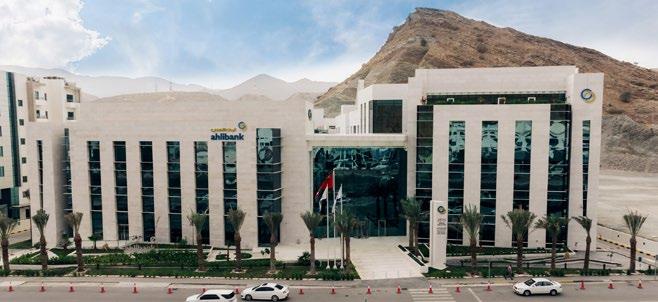
excellence and innovation embraced by the bank and underscores its ability to provide secure, advanced investment solutions that meet the needs of our customers, balancing strong returns with limited risks, further reinforcing our position as a leading financial institution in the region.”
Echoing the same, Noora Sabah Jawad Sultan, Chairperson - ahli islamic Money Market Fund, said: “At ahli islamic, we take pride in the performance of this exceptional fund,
which stands out due to its unique structure. This fund provides an attractive alternative to demand deposit accounts, offering investors high liquidity and a flexible solution for managing their financial allocations in bank deposits. Moreover, the fund focuses on investing in high-credit-rated market instruments, ensuring that investors’ funds are exposed to securities of investment-grade quality, thereby enhancing the achievement of optimal risk-adjusted returns, in line with the highest banking standards.”
Sohar International Announces RO2.1mn Debt Relief Initiative to Support Financially Distressed Omani Customers
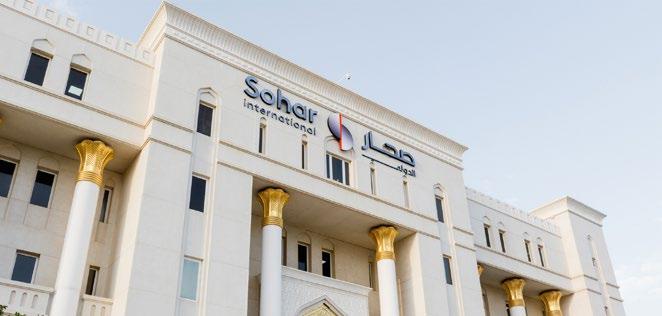
In line with its unwavering commitment to social responsibility and customer-centric values, Sohar International has announced a debt relief initiative totalling RO2.1 million. This initiative aims to support a select group of financially distressed Omani customers by alleviating their financial burdens and fostering economic stability.
As part of this initiative, eligible customers will have their outstanding debts with the bank absolved, provided they meet specified criteria including but not limited to financial, social, or health-related challenges. By addressing these pressing concerns, Sohar International seeks to provide much-needed relief to individuals facing financial hardship, ensuring they can
rebuild their financial well-being with greater confidence.
Commenting on this initiative, Abdulwahid Al Murshidi, Chief Executive Officer of Sohar International, stated: “At Sohar International, we recognise our responsibility to contribute to the financial security and prosperity of our community. This debt relief initiative is a testament to our unwavering dedication to supporting those in need and reinforcing our role as a trusted financial partner. By easing financial burdens, we aim to empower our customers, enabling them to navigate challenges and regain economic stability.” This initiative aligns with Oman’s sustainable development goals and Oman Vision 2040, reflecting Sohar International’s ongoing commitment to creating meaningful financial solutions that positively impact individuals and contribute to the nation’s long-term economic resilience.
Sulaiman Al
Harthi, Chief Executive Officer
of Oman Arab Bank shares an overview of the Bank’s milestone achievements in FY2024 in an exclusive interview

Transformation led Success
We focus on promoting SMEs and provide them with financial and technical support

Sulaiman Al Harthi, Chief Executive Officer of Oman Arab Bank noted that in 2024 the Bank has achieved significant progress, including growth in assets, an expanding financing portfolio, and a rise in net profits. He added that international credit rating agencies have upgraded their outlook of the Bank to ‘positive,’ a reflection of Oman’s strong economic and financial performance, as well as the improved sovereign credit rating of the country.
He emphasised that OAB continues to take tangible strides in implementing its comprehensive transformation strategy. This strategy is designed to enhance the Bank’s position as a distinguished financial institution, offering modern and innovative banking services that inspire trust and satisfaction across all customer segments. The initiatives launched under this strategy aim to reinforce the Bank’s leadership in providing tailored financial solutions and technical support services to both large corporations and small and medium enterprises (SMEs).
In an interview with Dossier magazine about OAB’s initiatives and operational performance, Al Harthi explained that the bank continues to progress in implementing its comprehensive transformation strategy in upgrading and developing its services and introducing new initiatives that directly and indirectly contribute to increasing its market share and enhancing operational performance.
Al Harthi highlighted the importance of focusing on ‘invisible assets’ that elevate the Bank’s reputation as a trusted brand in the banking industry. He explained that OAB prioritises customer satisfaction by addressing complaints and suggestions promptly, catering to the needs of individuals, large enterprises and SMEs. In addition, the Bank is continually developing products and services that align with the aspirations of these diverse customer groups.
A key pillar of the Bank’s efforts is its commitment to supporting SMEs. Al Harthi explained that the Bank has introduced various initiatives, including the Tomouhi Program, the SME Digital Services Platform, and specialised electronic applications. These initiatives are not limited to providing financial assistance but also include technical guidance, training, and workshops to raise awareness about financial, technical, and regulatory matters. Entrepreneurs also benefit from strategic partnerships that help them navigate challenges and achieve sustainable growth.
Sulaiman Al Harthi, CEO of Oman Arab Bank, emphasised the Bank’s unwavering commitment to empowering Small and Medium enterprises (SMEs) as part of its strategic initiatives. Reflecting on the past year, he highlighted the successful expansion of the SME training program under the Tomouhi initiative. This expansion broadened the scope of workshops to include all governorates and key economic hubs in Muscat, Sohar, and Salalah ensuring a comprehensive reach and impact on Oman’s entrepreneurial landscape.
In October 2024, Oman Arab Bank celebrated Omani Women’s Day with a distinguished program that garnered widespread appreciation. The event celebrated the achievements of Omani women and underscored their vital role in society and the economy. The Bank’s efforts to recognise and support women’s contributions remain a cornerstone of its social responsibility initiatives.
Building on its support for entrepreneurship, the Bank is actively working on developing a range of tailored banking products to facilitate SME credit access. This ongoing endeavour reflects the Bank’s pride in the success of its entrepreneurship initiatives, which are central to its reputation as a trusted institution providing financial, technical, and advisory support to SMEs and other entities. The Bank’s extensive expertise in this domain has proven instrumental in fostering sustainable growth across various sectors.
Al Harthi further highlighted the Bank’s dedication to promoting economic growth and creating job opportunities for Omani nationals. Last year, the Bank organised the third edition of the Annual CEO Summit, which served as a dynamic platform for exchanging insights, fostering innovation, and inspiring progress among Oman’s business leaders. The summit exemplified the Bank’s role in driving dialogue and collaboration to support the Sultanate’s economic aspirations.
Expressing immense pride in Oman Arab Bank’s workforce, Al Harthi acknowledged the crucial role played by its human resources in achieving strategic goals and enhancing service excellence. He noted that the Bank places a strong emphasis on talent development through programs such as OAB Ruwad, a leadership development initiative. This program is designed to strengthen the skills and expertise of OAB’s staff while engaging strategic partners from both the public and private sectors.
ROBUST PERFORMANCE
The banking sector has continued playing its role as a key enabler of economic growth in Oman and is set to be a bellwether sector for year 2025

The banking and finance industry in Oman has evolved significantly over the past decade, driven by modernization, regulatory reforms, and growing technological adoption. As of 2025, the industry remains a key pillar of Oman’s economy, with a strong regulatory framework supporting growth and stability.
Oman’s banks have posted robust results for year 2024. Omani banks listed on the Muscat Stock Exchange (MSX) posted a 15.2% year-onyear increase in net profits for 2024, reaching RO522.6mn, compared to RO453.5mn in 2023. The profitability boost is attributed to Oman’s economic growth and the improved performance of several key sectors, which bolstered banks’ earnings as they increased financing for both economic projects and individuals.
According to financial statements released by the banks, all seven listed institutions reported higher profits for the year. Bank Muscat led the pack, recording the largest profit at RO225.5mn, up from RO212.4mn in 2023, the Oman News Agency reported.
Sohar International Bank followed with a net profit of RO100.2mn, a notable increase from RO70.3mn in 2023. National Bank of Oman posted a profit of RO63mn, while BankDhofar reported RO43.6mn in net earnings. Other banks included ahlibank at RO41.6mn, Oman Arab Bank at RO30.4mn, and Bank Nizwa at RO18.1mn.
TOTAL ASSETS RISE
In terms of total assets, the seven listed banks saw a 7.3% increase year-on-year, reaching RO41.6bn by December 2024, up from RO38.8bn in 2023. Bank Muscat again led the sector with total assets of RO14.04bn. Sohar

International Bank followed with assets of RO7.3bn, while the National Bank of Oman had RO5.2bn in assets. BankDhofar ranked fourth with approximately RO5.1bn, and Oman Arab Bank placed fifth with RO4.3bn. Ahlibank’s assets totalled RO3.7bn, and Bank Nizwa’s assets stood at RO1.886bn.
Omani banking stocks performed well in 2024, with shares of five banks rising. Sohar International Bank saw the largest increase, with its share price climbing 37%.
Oman Arab Bank shares gained 8.4%, while ahlibank and the National Bank of Oman both saw increases of 5.7%. Bank Nizwa’s shares rose 1%. Conversely, Bank Muscat’s shares fell 4.5%, and BankDhofar’s shares dropped 2.5%. Banking stocks accounted for 26.2% of total trading value on the Muscat Stock Exchange, reaching a total turnover of RO305.5mn. However, overall trading value for banking stocks fell by 31.6% compared to 2023, when the sector recorded RO447.1mn in trades.
SECTORAL OVERVIEW
Oman has a well-established banking sector, with both conventional banks and Islamic banks operating within the country. The key players in the market include both domestic banks and foreign banks, offering a wide array of services ranging from retail banking to corporate finance.
The Central Bank of Oman (CBO) oversees the regulation and supervision of the banking sector. In recent years, CBO has implemented various reforms to modernize the banking infrastructure, boost transparency, and ensure financial stability.
Islamic banking has been growing steadily, with increasing demand for Sharia-compliant financial products. Oman’s Islamic finance
BANKING
ECONOMY

market is expected to continue expanding as part of the government’s push to diversify its economy.
Oman’s economy has been transitioning away from oil dependence, with greater emphasis on sectors like tourism, manufacturing, and services. The banking and finance industry plays an essential role in financing these efforts and fostering economic diversification. Economic recovery and growth is expected to continue through 2025, with positive impacts on loan growth, retail banking, and investment activities.
PERFORMANCE INDICATORS
The banking sector in Oman is expected to see moderate growth in 2025. The economy’s diversification efforts, coupled with ongoing infrastructure and real estate developments, will lead to a stable growth trajectory for the sector. Banks will likely see steady demand for loans, particularly in sectors related to infrastructure, real estate, and SMEs (small and medium-sized enterprises).
Interest rates are expected to remain relatively low, following the global trends of central banks keeping rates low to support economic recovery. Increased focus on digital banking will continue to drive innovation, with banks offering a wider range of online and mobile banking services. Digital adoption is expected to increase, particularly in the areas of e-wallets, mobile banking apps, and financial services tailored for a younger, tech-savvy population.
While the economy recovers, banks will continue to manage NPLs cautiously, with the risk of defaults being lower compared to the pandemic years. However, banks will remain vigilant, especially in the consumer lending sector.
Performance of Individual Banks in Oman (2025 Predictions):
BANK MUSCAT:
Bank Muscat remains the largest and one of the most dominant players in Oman’s banking sector. It continues to be a leader in retail and corporate banking, with a strong presence in Oman and an expanding footprint in the GCC (Gulf Cooperation Council). Bank Muscat is expected to show solid growth in 2025, particularly in its corporate banking, investment banking, and Islamic finance offerings. The bank has been at the forefront of digital banking innovation and is expected to maintain this leadership position with its strong mobile banking platform.
The bank’s overall performance in 2025 is expected to be stable, with moderate loan growth and a low NPL ratio, thanks to robust risk management practices.
OMAN ARAB BANK (OAB):
OAB has continued to expand its presence both domestically and regionally. The bank is particularly focused on enhancing its customer experience through digital channels, and its retail banking services are expected to see
strong demand in 2025. OAB’s retail loan portfolio is expected to perform well in 2025, driven by the bank’s growing portfolio of home loans and personal loans. Corporate banking is also likely to see a boost as demand for financing for infrastructure projects picks up.
The bank’s continued investments in technology, coupled with its focus on customer satisfaction, will likely position it for steady growth in the coming years.
AHLIBANK:
Through continuous innovation, embracing digital transformation, and enhancing sustainability, ahlibank is moving towards achieving its goals. Its customer centric approach has helped it evolve and excel, not only to meet today’s needs, but also to prepare for tomorrow’s requirements. Through this comprehensive vision, ahlibank will remain a model of leadership and responsibility, dedicating its efforts to serving the community and contributing to building a strong and sustainable economy.
BANKDHOFAR:
BankDhofar has gained a reputation for its customer-centric approach and has increasingly focused on growing its digital and retail banking services. The bank’s performance in 2025 is expected to show strong growth in its
retail banking segment, especially in terms of personal loans and credit cards, as the Omani economy recovers.
BankDhofar is expected to see a modest increase in both deposits and loans, with a continued push to enhance its digital banking services. It should maintain its position as one of the top mid-tier banks in Oman.
NATIONAL BANK OF OMAN (NBO):
NBO has continued to focus on strengthening its corporate banking and wealth management services, and it has formed several strategic partnerships to enhance its product offerings. NBO’s performance in 2025 is expected to be stable, with a strong focus on corporate loans, particularly in infrastructure and project financing. The bank’s wealth management and private banking services will likely see continued demand from high-net-worth individuals.
With an ongoing focus on niche markets, particularly wealth management, NBO is expected to remain one of the leading banks in the Sultanate, with moderate but steady performance.
SOHAR INTERNATIONAL
Sohar International has made significant
investments in digital banking in recent years. The bank’s performance in 2025 will be closely tied to its ability to expand its digital offerings and attract tech-savvy customers. The bank is expected to see strong growth in digital channels, such as mobile banking apps and e-wallet services, which will drive revenue. Corporate lending will remain an important contributor to the bank’s overall performance.
Sohar International is expected to continue its growth trajectory, focusing on digital banking innovations and enhanced customer experiences. The bank’s performance is likely to show improvement in both profitability and market share.
BANK NIZWA:
Bank Nizwa, as one of Oman’s leading Islamic banks, will continue to grow its share in the Islamic banking sector, which is expected to see increasing demand in 2025. With the government’s focus on developing Islamic finance and the growing appetite for Shariacompliant products, Bank Nizwa is poised for steady growth in both deposits and financing. Retail banking, in particular, will see strong growth.
Bank Nizwa is expected to perform well in 2025, benefiting from Oman’s growing focus on Islamic finance, though it may face competition from larger banks diversifying into this sector.

LOOKING AHEAD
In 2025, Oman’s banking and finance industry is expected to be in a period of moderate growth, with the sector continuing its growth and benefiting from ongoing diversification of the economy. Banks will maintain solid performance, with strong digital transformation efforts, moderate loan growth, and a focus on both retail and corporate banking. The shift towards digital banking, Islamic finance, and sustainable investment will be key drivers of growth, while maintaining financial stability and managing risk will remain priorities for both regulators and financial institutions. Oman’s real GDP is likely to expand 3.1 percent in 2025 and 4.4 percent in 2026, the International Monetary Fund forecasts and Oman’s Banking industry is expected to continue its growth journey.

GROWTH POTENTIAL
Oman’s health insurance market is projected to reach a market size of $319mn in 2024
Oman’s gross written premium is expected to grow annually at a rate of 6.39 per cent (CAGR 2024-2029), resulting in a market volume of $434.80m by 2029.
Gross direct premiums of Oman’s insurance sector rose by 4.5 per cent to RO565.512mn at the end of 2023 compared to RO541.326mn of 2022, according to published data of the Financial Services Authority (FSA), the regulator of the insurance sector in Oman. Gross direct premiums for health insurance increased by 12.9 per cent to RO216.213mn in 2023, up from RO191.517mn in 2022. In the general insurance segment, gross direct premiums dipped 0.2 per cent to RO 281.882 in 2023 compared to RO282.538mn in 2022. It rose 0.2 per cent to RO67.418mn for Life & Saving insurance, compared to RO67.271mn in 2022.
Further, total claims paid out in 2023 increased by 1.8 per cent to RO322.806mn in 2023, up from RO317.035mn in 2022. According to the FSA, the audited financial statements of insurance companies indicate a decrease in the total claims paid for the general insurance business by 9.8 per cent to RO123.880mn in 2023. Claims paid for the Life & Saving insurance business have decreased by 17 per cent in 2023, while the health insurance segment saw a 17 per cent jump in claims to RO171.434mn. Gross claims paid by the national insurance companies have increased by 5.9 per cent in 2023.
The overall profitability of insurance companies was lower in 2023, according to the Authority. Total net profits of the insurance companies were RO25.865mn in 2023 compared to RO29.499mn in 2022 decreasing by 12.3 per cent. Profits of the national insurance companies were RO16.501mn in 2023 compared to RO18.359mn in 2022 which represents a decrease of 10.1 per cent. Net profits of the foreign insurance companies were RO9.364mn in 2023 compared to profits at RO11.141mn in 2022, which indicates a decrease by 15.9 per cent.
Oman’s insurance industry is projected to grow at an annualized rate of 4.5 percent, reaching $1.8bn in 2028, up from around $1.4bn in 2022, according to the UAE-based investment banking advisory firm Alpen Capital. Insurance indices of the unaudited financial statements of first half of 2023 indicate that insurance premiums continued to
grow by an increase of 11.9 per cent compared to the same period of 2022. Gross written premiums reached RO332.9mn where national companies took over the largest percentage 85.7 per cent at about RO285mn compared to RO250mn in the previous year. As for foreign companies, the premiums reached RO47.8mn. Takaful companies’ premiums accounted for 11 per cent of the total insurance premiums of all companies at a total value of RO37mn, an increase by 4.3 per cent compared to the same period in 2022.
In addition, data indicates an increase by 17 per cent at a value of RO115mn in the volume of paid compensations by insurance companies for damages that the policyholders have incurred. Compared with first half of 2023, Takaful insurance figures decreased by 6 per cent at more than RO9.6mn of the total net compensations.
Moreover, written results of insurance companies illustrated that general insurance recorded the highest percentage of insurance premiums reaching more than RO160mn in first half of 2023 compared to RO153mn at the same period last year, which is an increase by 4.6 per cent followed by health insurance that increased by 22.6 per cent at RO110mn. As for life insurance, the value of total direct premiums amounted to more than RO37mn compared to RO33mn in the previous year.
The data also showed an improvement in the net insurance premiums; which are the premiums retained after the deductions for reinsurance as such premiums rose by 14.1 per cent at a value of RO193mn in comparison to about RO169mn in the previous year. This increase resulted from the increase of net premiums in most insurance types as life insurance recorded the highest increase amongst all insurance types by 69 per cent at RO7.7mn. Additionally, net premiums of property insurance amounted to RO8.7mn, an increase by 37.3 per cent compared to last year, and net premiums of health insurance rose by 18.4 per cent at about RO105mn. Health insurance was the key trend impacting the industry.
Finally, operational results show that earned premiums value, net compensations and administrative and general expenses increased by 10.54 per cent, 17.08 per cent and 6.01 per cent, consecutively. The gross written premium (GWP) of the Oman insurance market was RO574.6mn in 2023. The market will achieve a CAGR of more than 4 per cent during 2024-2028.

The demand for comprehensive health insurance coverage in Oman has grown considerably in recent years, driven by the expansion of the healthcare system and a heightened awareness of the importance of health insurance
CREATING PATHWAYS
The Financial Services Authority seeks to increase market activity by attracting investors from all segments, from large businesses, family-owned enterprises, small and medium-sized enterprises (SMEs) and start-ups
The Financial Services Authority (FSA), Oman’s capital market regulator and other key departments — including the Ministry of Finance (MoF), Ministry of Commerce, Industry and Investment Promotion (MOCIIP), Muscat Stock Exchange (MSX) and Estidamah (National Programme for Fiscal Sustainability and Financial Sector Development) has announced details of the Capital Market Incentives Program, a strategic initiative based on Royal Directives and aimed at enhancing Oman’s investment and business climate.
The CMIP is structured to engage private sector entities by providing them with three entry points or pathways for listing on the MSX over a five-year period, with each entry point being complemented by a tailored incentive framework. Through this Program, the FSA seeks to increase market activity by attracting investors from all segments, from large businesses, family-owned enterprises, small- and medium-sized enterprises (SMEs) and start-ups. The first pathway is designed to include companies in the main stock market. The second pathway introduces the Muscat Stock ExchangeAlternative Investment Market (MSX-AIM), an innovative platform dedicated to the advancement of emerging companies. The third pathway is aimed at facilitating the

conversion of limited liability companies (LLCs) to closed joint stock companies (SAOCs), thereby enabling their transition to a more robust corporate stature within the capital market ecosystem.
The Financial Services Authority (FSA) was established in Oman on March 25, 2024, by Royal Decree 20 of 2024 (“FSA Law”), with its headquarters based in the Governorate of Muscat. In essence, the FSA has now replaced the Capital Market Authority (CMA).
The FSA has approved electronic platforms for 5 insurance companies out of 17
companies further to a number of electronic platforms of insurance brokers since the issuance of the Regulations for Electronic Insurance Operations, the most recent of which were two electronic platforms to provide integrated insurance services of Takaful Oman and Liva Insurance.
FSA granted the approval for the two companies to provide digital services through the approved platforms after ensuring they satisfy all the requirements provided for in the Regulations for Electronic Insurance Operations issued

in the last quarter of 2023 vide Decision No. (80/2023), which is a regulatory and legislative framework for providing digital insurance services in the Sultanate of Oman. The regulation obligates each insurance company to establish its own electronic platform to render integrated digital insurance services and permits insurance brokerage firms to establish an electronic platform to provide the licensed services. The regulation prohibits providing any electronic insurance operations in the Sultanate of Oman except after obtaining approval from the FSA.
An awareness campaign titled, “Credit Life Insurance” was launched through different media channels and social media accounts to enhance awareness, ensure the role taken by insurance as an effective tool for risk management, and introduce insurance products especially the mandatory ones. The campaign is meant to increase awareness of the policy issued by decision no. (4/2024) and entered into force in June 1, 2024. Statistics show that almost 70,000 policies were issued within the first six
months of the Unified Credit Life Insurance Policy’s approval. This policy is achieving its intended regulatory goals which are based on providing protection to policyholders and other parties.
In 2023, the erstwhile CMA announced several legal and regulatory developments in relation to the insurance sector, aimed at achieving the objectives set out in the Tenth Five Year Development Plan 2021 – 2025. During October 2023, it issued three regulations within a span of three days, as well as a policy in January 2024. They are as follows: Regulation for Bancassurance; Regulation for E-Insurance on 12 October 2023; Regulation for Health Insurance Electronic Link and Unified Credit Life Policy. All these regulations and policies help to achieve CMA’s strategic objectives, which according to the 2022 Annual report, include enhancing the financial sustainability level, achieving an average growth of 10 per cent annually in the insurance indices, raising the level of insurance awareness to 25 per cent of the total population by 2025 as well as increasing the level of CMA’s performance efficiency.
The Capital Market Incentives Program aims to encourage investment in the capital market. The program outlines three pathways that are intended to bolster capital market participation from all market segments
With regard to zero carbon neutrality by 2050 and in line with the objectives of the United Nations Sustainable Development 2030 and the targets of Paris Climate Agreement and conferences, the CMA worked to create a framework for green funding as an innovative means of funding available to the companies desirous of funding and socially responsible investors who aim their investment to be in line with the global trend in environmental preservation and sustainability. The procedures for formulation of the legislations regulating the green bond and Sukuk have been completed and are in the final phases of issuance. The CMA is working, to align the capital market and insurance sector with the requirements of green and sustainable funding instruments. Further, it also plans to enhance the level of financial sustainability, achieving a 10 per cent growth in the capital market and insurance sectors’ indicators, and raising the level of awareness in the two sectors among the population to 25 per cent of the total population by 2025.

Negotiating the future
The Banking and Finance industry is being impacted by multiple influences from technology adoption to customer centricity. A brief look at the trends shaping the BFSI in the year ahead
The banking and finance industry in 2025 is likely to be shaped by several key trends that reflect ongoing technological advancements, shifting customer preferences, and regulatory developments. Here are some of the major trends expected to play a significant role:
1. Artificial Intelligence (AI) and Automation
• AI-Powered Personalization: Banks will use AI to deliver hyper-personalized services to customers, offering tailored financial advice, investment recommendations, and even credit scoring based on individual behaviors and preferences.
• Robotic Process Automation (RPA): Automation will continue to streamline back-office operations, reducing costs and improving efficiency in areas like compliance, risk management, and customer service.
2. Embedded Finance
• Seamless Integration: Financial services will be integrated into non-financial platforms (e.g.,
e-commerce, social media, etc.), enabling businesses to offer payment solutions, lending, insurance, and more without customers leaving their preferred platforms.
• BaaS (Banking as a Service): Smaller fintech companies will leverage BaaS platforms to offer a wide range of banking products, democratizing financial services for consumers.
3. Blockchain and Cryptocurrencies
• Blockchain for Security & Efficiency: Blockchain technology will likely play a bigger role in ensuring secure, transparent, and efficient transactions, especially in areas like cross-border payments, supply chain finance, and smart contracts.
• Central Bank Digital Currencies (CBDCs): Governments may start experimenting more with CBDCs to digitalize their national currencies, offering new ways for consumers to store and transfer money.
4. Sustainability and ESG (Environmental, Social, and Governance) Factors
• Green Finance: Investors and financial institutions will increasingly focus on sustainability, with a growing emphasis on financing projects that promote environmental and social good. Banks will offer green bonds, sustainable investment funds, and ecofriendly financial products.
• ESG Integration: ESG criteria will become increasingly important
in lending and investment decisions, as customers and stakeholders demand more responsible practices from financial institutions.
5. Open Banking
• Customer-Centric Ecosystems: Open banking regulations, like PSD2 in Europe, will encourage banks to share data with authorized third-party providers, leading to the development of more innovative financial products and services that better serve customer needs.
• Fintech and Bank Collaboration: Rather than seeing fintech companies as competitors, traditional banks will likely form partnerships with fintechs to innovate and improve their digital offerings.
6. Cybersecurity and Privacy
• Advanced Cyber Defense: With the rise in digital transactions, cybersecurity will remain a critical concern. Banks will invest heavily in advanced technologies like biometrics, multifactor authentication, and AI-based threat detection systems.
• Data Privacy: As data breaches become more common, customers will demand stronger data protection. Financial institutions will need to balance convenience with safeguarding customer privacy, particularly in light of stricter global privacy regulations.
7. Digital and Neo Banks
• Rise of Digital-Only Banks: Fintechdriven digital banks will continue to grow, offering simplified, low-cost banking services without the overhead of traditional brick-and-mortar branches. These banks will appeal to younger, tech-savvy customers who prefer managing finances via mobile apps.
• Neo-Banking Innovation: Neobanks (digital-only banks that offer niche services) will cater to specific customer segments, providing tailored solutions like financial wellness tools, automated savings, or investment platforms.

8. RegTech and Compliance Automation
• Regulatory Technology (RegTech): Banks will increasingly adopt RegTech solutions to streamline compliance processes, reduce regulatory risks, and improve transparency. This will include automated tools for monitoring transactions, managing risk, and meeting regulatory reporting requirements.
9. Digital Identity and Self-Sovereign Identity (SSI)
• Self-Managed Digital Identity: Customers will have more control over their digital identities, which will allow them to manage access to personal data and streamline processes like KYC (Know Your Customer) in a secure and private manner. Banks and financial services will adopt more decentralized identity management systems.
10. Customer Experience (CX) Revolution
• Omni channel Banking: Banks will continue to develop seamless experiences across digital and physical touchpoints, enabling customers to
interact with their bank in whichever way suits them—whether it’s through apps, online platforms, voice assistants, or in-branch visits.
• Voice and Chatbots: AI-powered chatbots and voice assistants will become even more sophisticated in handling customer inquiries, providing real-time support, and even completing transactions.
11. Fintech Investment Surge
• Continued Venture Capital Investment: The fintech sector will continue to see substantial investment, with a focus on companies that are solving pressing issues like financial inclusion, cross-border payments, and lending automation. Financial institutions will also increase their own innovation labs to incubate new ideas and startups.
In summary, the banking and finance landscape in 2025 will be dominated by the integration of advanced technology, increasing focus on sustainability and responsible investing, and an evolving regulatory environment. Institutions that embrace innovation while maintaining strong security, compliance, and customercentric models will thrive in this rapidly changing environment.
Mashreq Expands Corporate Banking Footprint to Oman with Tailored Financial Solutions
Mashreq, one of the leading financial institutions in the MENA region, has announced its entry into Oman, seeking to strengthen its position with a range of personalized financial services tailored for the Sultanate’s evolving corporate and public sectors. This strategic move underscores Mashreq’s intent to contribute to Oman’s Vision 2040, with ambitions to fuel economic diversification and elevate Oman’s position in the global financial landscape
Mashreq’s entry into Oman comes amid growing demand for financial solutions aligned with regional and global market trends. The bank’s proven track record of industry-leading initiatives and adaptability solidifies its role as a significant growth partner in the region. It was recently named the fastest-growing banking brand in the Middle East by Brand Finance’s 2024 Banking 500 rankings and has consistently secured Euromoney’s “Market Leader in the Middle East” title for trade finance and cash management from 2019 to 2023.
Ahmed Abdelaal, Group CEO of Mashreq said “Oman’s strategic location and its dynamic economic landscape make it essential to
Mashreq’s international growth ambitions. Our goal is to support Oman’s economic objectives through tailored financial solutions that not only enhance regional integration but also reinforce Oman’s influence in the global financial ecosystem. Our commitment is to high-growth markets, leveraging trade, investment, and corporate banking opportunities while delivering an exceptional client experience built on convenience, accessibility, and ESG-driven initiatives.”
Tarek El Nahas, Group Head of International Banking at Mashreq, noted, “Our expansive international footprint grants our clients access to some of the most strategically vital markets in the region. By combining global
reach with deep local expertise, we navigate regulatory landscapes with agility, offering solutions that drive financial efficiency and resilience. This approach empowers clients to optimize their cross-border operations, capturing opportunities essential to long-term success in today’s competitive market.”
AlSalt Mohammed Al Kharusi, Mashreq’s Country Head for Oman, remarked, “With over five decades of global innovation, Mashreq’s expansion into Oman reinforces our dedication to being a strategic partner in the nation’s economic development. Our focus is on fostering a resilient generation of entrepreneurial talent and supporting the growth of a dynamic, knowledge-
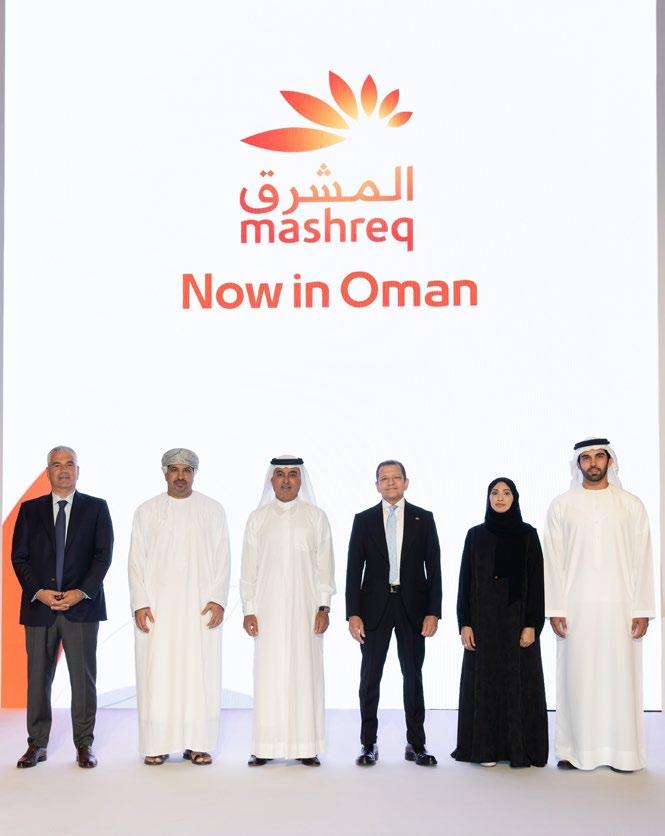
driven economy. We are fully committed to supporting Oman’s national priorities, advancing growth, and contributing to a sustainable, prosperous future for generations to come.”
Mashreq’s entry into Oman will bring a comprehensive suite of banking services, including treasury, global transaction banking, and sustainable finance. Through its innovative approach and robust operational structure, the bank aims to unlock value in critical sectors like tourism, logistics, manufacturing, and renewable energy, in line with Oman’s economic objectives.
Mashreq is almost a half-century old, yet proudly thinks like a challenger, startup, and
innovator. Mashreq pioneered key innovations and developments in banking, starting with entry-level digital-first customers all the way to powering some of the region’s most prominent corporations and wealth accounts.
The bank’s mandate is to help customers find their way to Rise Every Day, partnering through the highs and lows to help them achieve their goals and unlock their vision of success. Reassuringly present in major financial centres of the world, Mashreq’s home and global HQ remains in the Middle East, offering services whenever and wherever opportunity takes its customers. Mashreq has been recognized as the fastest-growing Middle East brand, by Banking 500 rankings for 2024 by Brand Finance.
Mashreq’s entry into Oman will bring a comprehensive suite of banking services, including treasury, global transaction banking and sustainable finance

GCC banks’ performance set to remain strong in 2025 according to S&P Global Ratings
The banking sector in the GCC is expected to maintain strong performance in 2025, despite the potential impact of lower interest rates, according to a recent report from S&P Global Ratings. In its GCC Banking Sector Outlook 2025, S&P highlighted that banks across the GCC region are benefiting from strong profitability, robust asset quality, healthy capitalisation, and ample liquidity. ‘We expect this performance will continue in 2025, even though it will likely be modestly affected by lower interest rates,’ the rating agency said.
However, S&P cautioned that an unexpected escalation in geopolitical risks or a sharp drop in oil prices could undermine the sector’s creditworthiness. ‘Depending on how the scenario unfolds, we expect banks will be relatively resilient,’ it added.
S&P expects Brent crude to average $75 per barrel in the fourth quarter of 2024, and to remain at similar levels through 2025-2027. This price level is likely to benefit most GCC economies, as per the report.
The ratings agency also pointed to the region’s economic diversification efforts, including Saudi Arabia’s transformation initiatives, Qatar’s expanding gas production, and ongoing reforms in Bahrain and Oman, as further supportive factors for banks. Strong growth in the non-oil sector, particularly in Bahrain and the UAE, is also seen as a positive.

‘Within this context, we think GCC banks will continue to grow their lending books without generating major macroeconomic imbalances. Lending will range from a high 8%-9% in Saudi Arabia and the UAE to a modest 3%-6% in other GCC countries,’ the rating agency said.
Regarding asset quality, S&P forecasts that GCC banks’ indicators will remain stable over the next 12-24 months. In terms of interest rates, S&P predicts the US Federal Reserve will cut rates by 225 basis points by the end of 2025, in additional to the 75-basis point reduction already implemented. The agency expects central banks across the GCC to mirror these cuts to varying degrees.
GCC OUTLOOK


‘The overall effect of the rate decline on profitability is negative. Yet it could reduce unrealised losses in securities portfolios and the cost of funding for banks that rely heavily on external funding,’ the agency said.
S&P also underscored that GCC banks are predominantly funded by domestic deposits, which have proven resilient during periods of economic stress, such as the COVID-19 pandemic. Public sector deposits typically make up between 20% and 30% of the total deposit base.
UAE, KUWAIT, AND QATAR LEAD GCC BANKING STABILITY
A recent analysis by S&P Global identified the UAE, Kuwait, and Qatar as stable economies poised to support the region’s dynamic banking sector in 2025. The report attributed this optimistic outlook to strong capital buffers, favourable economic conditions, and
supportive government policies, positioning these GCC countries as key players in regional financial stability.
Kuwait’s resilient economy, bolstered by lower interest rates and diversified asset classes, takes centre stage in the country’s growth narrative. According to the S&P Global report, the Kuwaiti banking sector is a critical stabilizer against market fluctuations driven by regional geopolitical tensions. Despite the potential profitability challenges of lower interest rates, stable lending growth rates in Kuwait are well positioned to offset these effects. These findings align with Kuwait’s favourable Fitch Ratings from November 2024, which reaffirmed the nation’s economic stability and robust financial outlook.
Puneet Tuli, S&P Global Ratings credit analyst, said, “After an estimated 2.3% contraction in 2024, we expect Kuwait’s GDP growth will rebound to 3% in 2025 as OPEC+ oil production restrictions are
gradually eased, and project implementation and reform momentum improves.” The report spotlighted Kuwait’s robust capital buffers, which allow national banks to retain as high as 50% of profits, thus prioritizing capitalization. According to Tuli, these policy efforts are often supplemented by “private sector deposits from corporations and households, which dominate Kuwaiti banks’ funding base.”
Qatar’s economic growth has followed a trajectory similar to that of its GCC neighbours. The country’s economy benefits from abundant liquidity, supporting expansion in emerging non-oil sectors. Liquefied natural gas production, which
influences Qatar’s developing nonhydrocarbon economy, is expected to drive credit growth in the coming years.
Juili Pargaonkar, S&P Global Ratings credit analyst, remarked, “Geopolitical tensions in the Middle East are high, but we currently do not expect a full-scale regional conflict, and we anticipate macroeconomic conditions in Qatar will remain broadly stable.”
S&P Global predicts improved asset quality metrics and reduced credit losses in the UAE by 2025. The analysis also highlights a significant deposit increase over the past three years, which is expected to support the UAE’s economic momentum in 2025.
PROFITABILITY, ASSET QUALITY TO BOOST RESILIENCE
The banking sector in the Gulf Cooperation Council (GCC) region has been doing well. Banks have reported strong profitability and asset quality indicators in addition to strong capitalization and sufficient liquidity. This performance is expected to continue next year despite lower interest rates potentially affecting growth.
However, an unanticipated, severe increase in geopolitical risk or a major decline in oil prices could weigh on the GCC banking sector’s creditworthiness. In its latest GCC

Banking Sector Outlook 2025, S&P Global Ratings says that while it does not expect a full-scale regional war in the Middle East, a significant escalation could derail the macroeconomic environment in the region. As for interest rates, the agency expects lower rate to benefit systems that depend on external funding. However, lower revenues could impair banks’ bottom lines if the cost of funding or the cost of risk does not decline.
OIL PRICES, PROJECTS TO SUPPORT GROWTH
We expect the Brent oil price will average $75 per barrel in the fourth quarter of 2024 and over 2025-2027, which will be helpful for most GCC countries. “In our view, GCC countries will also benefit from the implementation of economic transformation projects (Saudi Arabia), the expansion of gas production (Qatar), reform implementations (Bahrain and Oman), and the non-oil economy’s good performance (Bahrain and the UAE),” added the report.
In this context, the GCC banking sector will continue to grow its lending books without generating major macroeconomic imbalances. Lending will range from a high 8-9 percent in Saudi Arabia and the UAE to a modest 3-6 percent in other GCC countries.
ASSET QUALITY TO REMAIN STABLE
Despite the previous shock from the COVID-19 pandemic, the non-performing loan ratio remained at 3-4 percent, benefiting from regulatory forbearance measures and the subsequent economic improvement. The write-offs of legacy NPLs also helped. At the same time, the GCC banking sector used the strong post-pandemic profitability to continue to set aside additional provisions, which created a cushion for any potential future shocks.
“We expect asset quality indicators will remain broadly stable over the next 12-24 months. Pressures remain in markets such as Qatar, where the real estate sector continues to suffer from oversupply after the World Cup in 2022,” added S&P.
Margins have improved due to higher rates, while the cost of risk is inching up in some countries as banks use excess profitability to prepare for potential shocks or to cover for risks related to exposures in non-domestic countries. However, banks in the region continue to display strong efficiency, which benefits from low labour costs and increasing digitalization.


